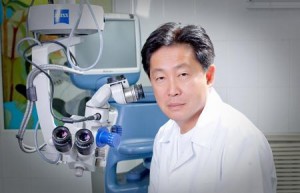 KARAGANDA – In the past, people with eye problems had to apply for consultation or an operation with Russian specialists. Today, the situation has changed, and the republic has its own professional ophthalmologists. Vladimir Kim is one of them. His eye microsurgery centres in Karaganda, Ust-Kamenogorsk, Shymkent and Astana are known to many people who need qualified ophthalmic care.
KARAGANDA – In the past, people with eye problems had to apply for consultation or an operation with Russian specialists. Today, the situation has changed, and the republic has its own professional ophthalmologists. Vladimir Kim is one of them. His eye microsurgery centres in Karaganda, Ust-Kamenogorsk, Shymkent and Astana are known to many people who need qualified ophthalmic care.
A graduate of the Alma-Ata State Medical Institute, he gained extensive practical experience at the Dzhambul Regional Hospital and 15 years ago arrived in Karaganda with a great desire to create an ophthalmology centre.
“We started with three rented medical rooms and one for surgery, if necessary. At the same time, we worked on mastering new technologies and always tried to offer high-quality services. The construction of our own clinic was a powerful incentive for us. At that time, it was a novelty because the economy had just begun to recover. We were also proud of the fact that we also made a contribution to our common cause of improving lives in the region,” he said.
Kim and his team have created several medical centres in the country, where ophthalmologic problems are solved with a 90 percent success rate. In our age of information technology, eye diseases have become a special problem and their treatment must be carried out with the use of modern techniques and the latest equipment. The treatment of diseases even as common as cataracts, for example, can be carried out with the use of well-known methods and recent medical advances.
“If we want to succeed, we must constantly be one step ahead, I truly believe this. Of course, this involves great responsibility and certain risks, but at the same time, it gives us huge advantages by keeping us prepared for new developments and ahead of our competitors,” the doctor said.
Today, the most common surgery treatment for cataracts is phacoemulsification. But 12 years ago, only skilled surgeons in a few clinics in Kazakhstan used this method. Kim was one of the first to use an ultrasound probe at such interferences. Its advantages are the ability to operate on a cataract at an early stage and the ability to replace opacity lenses with flexible intraocular lenses which are very important due to the lack of distortion in the postoperative period.
The main criterion of this operation for ophthalmologists is stability and safety, as well as the absence of post-surgical complications. These are good signs for the clinic, said the doctor.
Today, domestic clinics carry out about 25,000 operations for cataract extraction every year. But unfortunately, many more people need this type of surgery. According to the doctor, the state allocates considerable funds for guaranteed free medical care, but despite this, the budget is not able to cover all those wishing to receive these medical services.
“In our clinic, the waiting list is four to six months, but that is not the longest wait. For example, in Hungary, it may be two to three years. Considering the present stage of financing, a waiting list of six months is acceptable,” he explained.
In general, Kim and his team in their clinic in Karaganda carry out about 2,500 major operations a year. In such indicators as speed, quality and predictability of ophthalmology services, the centre is ahead of similar hospitals not only in the region but also nationwide.
“Now, thanks to President Nursultan Nazarbayev, a lot of attention is being paid to the development of healthcare in the country. I think that the duty of every physician is to be of maximum service to his patients and for the improvement of domestic medicine as a whole,” the doctor said.
Today, together with his team, he is taking the next step by adopting a new method. It entails combining traditional phacoemulsification with a femtosecond laser. This method makes the operation safer, more precise and more predictable. Moreover, it minimises the possibility of human error.
“The technology is very expensive, but it will justify itself. And in the future, it will also become the norm. And I’m happy that we are again in tune with the times and even one step ahead of them,” Kim added.

